
Earthling is the 21st studio album by the English musician David Bowie, released on 3 February 1997 through RCA Records in the United Kingdom, Virgin Records in the United States, and Arista Records/BMG in other territories. Mostly self-produced by Bowie, it was primarily recorded from August to October 1996 at New York City's Looking Glass Studios. Bowie composed the tracks with Reeves Gabrels and Mark Plati, who are credited as co-producers, with Mike Garson, Gail Ann Dorsey and Zack Alford providing overdubs later.

Lodger is the thirteenth studio album by the English musician David Bowie, released on 25 May 1979 through RCA Records. Recorded in collaboration with the musician Brian Eno and the producer Tony Visconti, it was the final release of his Berlin Trilogy, following Low and "Heroes". Sessions took place in Switzerland in September 1978 during a break in the Isolar II world tour, and in New York City in March 1979 at the tour's end. Most of the same personnel from prior releases returned, and the future King Crimson guitarist Adrian Belew joined from the tour. The sessions saw the use of techniques inspired by Eno's Oblique Strategies cards, such as having the musicians swap instruments and playing old songs backwards.
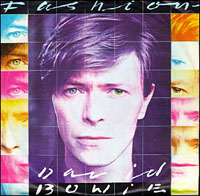
"Fashion" is a song by the English musician David Bowie from his 14th studio album Scary Monsters (1980). Co-produced by Bowie and Tony Visconti and recorded from February to April 1980 at New York and London, it was the last song completed for the album. Originating as a reggae parody titled "Jamaica", "Fashion" is a post-punk, dance and funk track structurally similar to Bowie's "Golden Years". King Crimson guitarist Robert Fripp contributed lead guitar.
"Joe the Lion" is a song by David Bowie in 1977 for the album "Heroes". It was produced by Bowie and Tony Visconti and features lead guitar by Robert Fripp.

"The Hearts Filthy Lesson" is a song by English musician David Bowie from his 20th studio album, Outside (1995), and issued as a single ahead of the album. Released in September 1995 by Arista, BMG and RCA, it showcased Bowie's new, industrial-influenced sound. Lyrically, the single connects with the rest of the album, with Bowie offering a lament to "tyrannical futurist" Ramona A. Stone, a theme continued in subsequent songs. The song is also meant to confront Bowie's own perceptions about the ritual creation and degradation of art. Its music video was directed by Samuel Bayer and was so controversial that it required a re-edit for MTV. The song appears in the end credits of the 1995 film Seven.

"Breaking Glass" is a song by the English singer-songwriter David Bowie. It was co-written by Bowie, bassist George Murray and drummer Dennis Davis in September 1976. Originally a track on Bowie's 1977 album Low, a reworked version of the song was a regular on the Isolar II Tour. A live version from that tour was used as the lead track on a 7-inch EP to promote his second live album, Stage in 1978. The EP reached number 54 on the UK Singles Chart in December 1978.

"Boys Keep Swinging" is a song by English musician David Bowie, released on 27 April 1979 by RCA Records in the United Kingdom as the lead single from his 1979 album Lodger. It was written by Bowie and Brian Eno and recorded in Montreux and New York City in September 1978 and March 1979. The recording utilised techniques from Eno's Oblique Strategies cards, which resulted in the musicians swapping instruments. Adrian Belew contributed a guitar solo, which he played receiving little guidance and was composited from multiple takes. The song was also built on the same chord sequence as the album track "Fantastic Voyage". Musically, "Boys Keep Swinging" contains elements of glam rock, funk and new wave, while lyrically, the song deals with the concept of gender identity, featuring various gender-bending lyrics. Bowie himself stated that the song was full of irony.
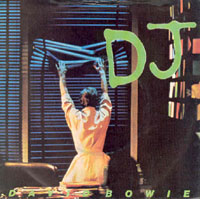
"D.J." is a song by English musician David Bowie, released on 29 June 1979 as the second single from his 1979 album Lodger. It was written by Bowie, Brian Eno and Carlos Alomar and recorded in Montreux and New York City in September 1978 and March 1979. A cynical comment on the cult of the DJ, the track includes a guitar solo by Adrian Belew, which was recorded in multiple takes, and then mixed back together for the album track. Bowie mimics David Byrne of Talking Heads in his vocal performance. Its accompanying music video, directed by David Mallet, features Bowie casually walking down London's Earl's Court Road as passersby recognise him and follow him, interjected with Bowie as the tortured DJ destroying his studio. The single charted at number 29 in the UK and has received positive reviews.

"Scary Monsters (and Super Creeps)" is a song by the English singer-songwriter David Bowie, released as the title track of his 1980 album Scary Monsters (and Super Creeps). It was also issued as the third single from that album in January 1981. Coming as it did in the wake of two earlier singles from Scary Monsters, "Ashes to Ashes" in August 1980 and "Fashion" in October the same year, NME critics Roy Carr and Charles Shaar Murray labelled its release another instance "in the fine old tradition of milking albums for as much as they could possibly be worth". The song was subsequently performed on a number of Bowie tours.
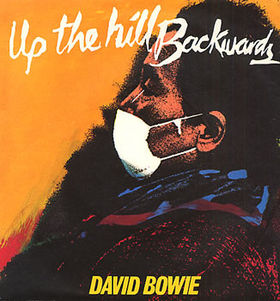
"Up the Hill Backwards" is a song by the English musician David Bowie, released on his 1980 album Scary Monsters . It was later issued by RCA Records as the fourth and final single from the album in March 1981. Originally written under the title "Cameras in Brooklyn", the song was recorded between February and April 1980 at the Power Station in New York City and Good Earth Studios in London. The recording features backing vocalists, guitar contributions from Robert Fripp and acoustic guitar played by co-producer Tony Visconti. Lyrically, the song concerns the struggles of facing a crisis, partially influenced by Bowie's divorce from his wife Angie. Musically, the song contains numerous time signature changes and a Bo Diddley-inspired beat.

"Stay" is a song by the English musician David Bowie, released on his 1976 album Station to Station. The song was recorded in late 1975 at Cherokee Studios in Los Angeles. Co-produced by Bowie and Harry Maslin, the recording featured guitarists Carlos Alomar and Earl Slick, bassist George Murray, drummer Dennis Davis, pianist Roy Bittan and Warren Peace on percussion. The track features prominent dual guitar work from Slick and Alomar, who mostly composed it in the studio. Based on the chord structure of "John, I'm Only Dancing (Again)", a funk reworking of "John, I'm Only Dancing" (1972), "Stay" emulates funk rock, soul and hard rock. The song's lyrics are abstract and relate to love.
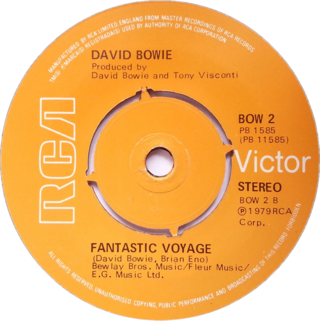
"Fantastic Voyage" is a song written by David Bowie and Brian Eno for the 1979 album Lodger. It has almost exactly the same chord sequence as "Boys Keep Swinging", from the same album. It has also appeared as the B-side to the "Boys Keep Swinging" and "Peace on Earth/Little Drummer Boy" singles, and the US edition of "D.J.".
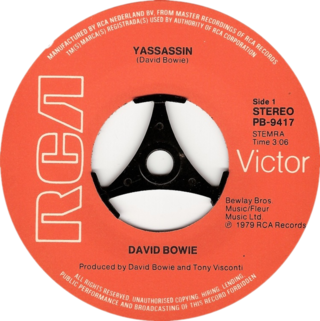
"Yassassin" is a song written by English singer-songwriter David Bowie for the 1979 album Lodger. "Yassassin" is an incongruous reggae song with a Turkish flavour.
"Teenage Wildlife" is a song written by David Bowie in 1980 for the album Scary Monsters . Running at almost seven minutes, the song was the longest track on Scary Monsters, and Bowie's longest composition since "Station to Station" (1976), although it was surpassed in length by later tracks such as 2003's "Bring Me the Disco King" and 2016's "Blackstar".
"Scream Like a Baby" is a song written by David Bowie. It appears on the 1980 album Scary Monsters .

"Dead Man Walking" is a song by English musician David Bowie, released as the third single from his 21st studio album, Earthling (1997). Written by Bowie and Reeves Gabrels, it was a top 40 hit in the UK, peaking at number 32. Bowie described "Dead Man Walking" as his homage "to rock and roll that is still young while we are all growing old". As such, the lyrics reflect his thoughts on aging at this point in his career.

A Reality Tour was a worldwide concert tour by the English singer-songwriter David Bowie in support of his 2003 album Reality. The tour began on 7 October 2003 at the Forum Copenhagen, Denmark, continuing through Europe, North America, Asia, including a return to New Zealand and Australia for the first time since the 1987 Glass Spider Tour. At over 110 shows, the tour was the longest tour of Bowie's career. A heart attack in late June 2004 forced the cancellation of some dates near the end of the tour. Bowie retired from performing live in 2006, making this tour his last.
The Outside Tour was a tour by the English rock musician David Bowie, opening in September 1995 and lasting over a year. The opening shows preceded the release of the 1. Outside album which it supported. The tour visited stops in North America and Europe.

Ricochet is a 1984 documentary film about the musician David Bowie. Made with Bowie’s full consent and participation, it was the second of such documentary productions following Cracked Actor from 1975. However, whereas Cracked Actor was made for television by the BBC's Omnibus strand, Ricochet was made for commercial release to the home video market.















